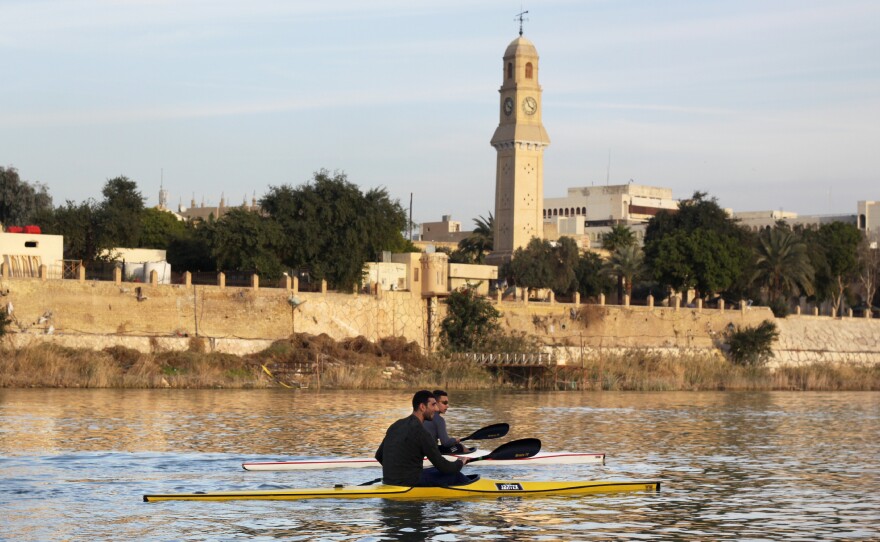Some of the world's loveliest cities hug great rivers. Budapest curves round the Danube, London's gracious gray buildings look out on the Thames.
Baghdad, however, doesn't conjure so easily the idea of lingering on a bridge, watching boats glide by.
But the city's river Tigris is as wide and wet as the Seine or the Nile, and Baghdadis have fun on it, too. Last weekend, moored next to the Mutanabbi Street book market was a big white party boat, with tinsel and silk roses festooning its rails, and pop music shaking its deck.
"Oh my God, it's so beautiful," said Zainab Louay, an English teacher wearing a purple cardigan, bracelets, headscarf and lipstick, snapping selfies with her new husband, Mohammad Rayan. "Especially the weather, the air when it touches your cheeks - beautiful."
Joined by families, and young men with tight shirts and gelled hair dancing to the music, the couple paid the equivalent of a few dollars to chug up the river a few minutes and back again.
"I was born here, so it's a tradition," said Fadel Khudair, who was there with his wife and three children. His father used to take him out on the river when he was small. His 11-year-old son, Abdullah, wishes he could drive the boat himself, but faster.
"It would be very nice! Make the people relaxed and happy," he said.
He'll bring his kids here one day, he added assuredly.
As the party boat thrummed along, smaller vessels buzzed alongside. River taxis on weekdays, they take people by the dozen out on weekend joyrides. Young men snap more selfies and post them on social media as they go.
Bassem Ali Shaka is 32, with tanned, leathery skin from driving these boats in all weather for 16 years.
"Now, thank God, it's safe," he said.
From Artery For All To Preserve Of The Rich
But there were dangerous times. He remembers a sniper in one of these riverside buildings who killed three passengers in 2006. The river police still won't let him pass beyond a bridge five minutes upriver.
The Tigris used to be an artery of Iraq. A century-old National Geographic has a report by Frederick and Margaret Simpich on seeing Baghdad for the first time from the deck of a Tigris steamer sailing from the northern city of Mosul ("Baghdad looms up boldly, its splendid skyline of domes and minarets reminding one of some 'Midway' of World's Fair memory").
Sepia photographs show a waterfront bustling with odd little boats, and the writers describe the clusters of goofahs – round rowboats paddling people ashore, and rafts called keleks kept afloat with inflated goatskins, bringing goods from Mosul.
With better roads, cars and railways, gradually fewer people paddled their lives down the river. There aren't keleks or goofahs in Baghdad anymore. And during the long rule of Saddam Hussein, some say the river became the preserve of the rich: government buildings or the houses of officials backed onto it, not restaurants or walkways.
The journalist Zuhair al-Jezairy reflects on this in his book Devil You Don't Know, in which he returns from exile in 2003 and visits a row of riverside restaurants on Abu Nuwass Street where in his youth he would drink all night with bohemian friends.
Jezairy writes: "The Great Leader did not want Baghdadis to share the river with him so he fenced it off with barbed wire and sowed fear along its banks in the form of guards who stood at intervals, watching the passers-by aggressively."
Parts were also off limits when the U.S. ran the protected "Green Zone" of government, embassies and wealth on the river's west bank.
A Revival Along The Riverbank
These days the restaurants of Abu Nuwass are busy again – though perhaps selling more barbecued carp than alcoholic drinks. Just downriver there's an anchored floating restaurant where hookah smoke curls up from the top deck. A scheme to expand the water taxis and start a boat going all the way from Baghdad to the sea was unveiled last spring.
And there are still oars paddling through the Tigris. At the Baghdad Rowing Club, Ahmed Sittar, a national athlete, comes to row every day.
"When I row I feel romantic," he said. He dreams about his future.
His coach, Hassan Showkat Hassan, said Iraqis generally prefer soccer to rowing, and the capital's ongoing security problems mean that for the most part only people who live locally can come regularly to practice. But he hopes for more riverside public places. There are too many ministries along the riverbank, he said.
Sittar, the rower, pulled his oars out of rowlocks and laughed in the golden afternoon sunlight.
"This is my life," he said. "My life, all the time in the river."
Copyright 2015 NPR. To see more, visit http://www.npr.org/.






